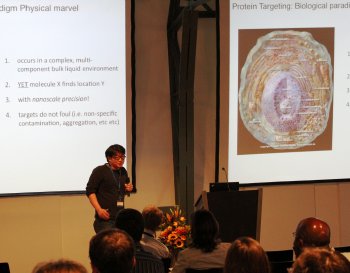JPK Instruments recently hosted their tenth annual international symposium on the applications of scanning probe microscopy (SPM) and optical tweezers. Held this month in the historic Umspannwerk Ost in Berlin, the meeting brought together more than 100 scientists from around the world.
The combination of papers and posters inspired excellent discussions as attendees presented their results and shared scientific know how in a relaxed and informal atmosphere.
 Professor Roderick Lim presenting his research at JPK’s 2011 International Life Sciences Symposium.
Professor Roderick Lim presenting his research at JPK’s 2011 International Life Sciences Symposium.
This year saw a first presentation from a Chinese user group (Professor Wenke Zhang of Jilin University) and, with visitors coming from all corners of the globe, it felt more international than ever. The poster sessions are always popular with presenters vying to be selected as the winner as judged by their peers. The standard was higher than ever.
The SPM papers saw the emergence of a new theme - cellular spaghetti - with three speakers describing how it is possible to probe and follow processes in nuclear pore complexes. Probing molecular forces is becoming a very popular topic not just in research but is being adapted to practical problems encountered in the field of pharmaceutical science and nanomedicine.
The 2011 SPM poster award went to Huong Nguyen, a PhD student at the Max-Planck-Institute for Polymer Research in Mainz. She showed how she has used atomic force spectroscopy to study interactions on the single molecule level. She demonstrated piconewton resolution in a study of the rupture force of single small drug molecules binding to a split aptamer. The work illustrated how to overcome sample preparation through immobilization of both components of the aptamer to the AFM probe and the sample surface.
The Optical Tweezers poster award saw a battle between two researchers from the BIOTEC TU Dresden and for the second year running, Anita Jannasch emerged as the winner with her work presented jointly with Mohammed Mahamdeh. The study looked at the inertial effects of a small Brownian particle and the ability to track and measure the colour of thermal noise intensity. The potential of this work shows possibilities for application in the development of advanced sensors.
Presenting the awards, Torsten Jähnke, Chief Technical Officer of JPK, said "the standard of this year's talks and posters was excellent. I was excited to see another exciting group of young researchers presenting their posters at our tenth year of workshops. It shows that where there is good science being presented, we will continue to attract a big audience."